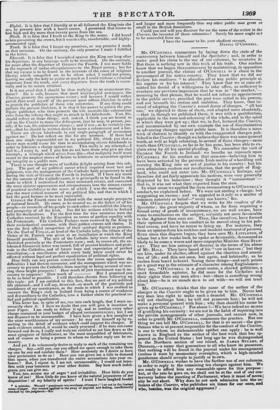Mr. O'CONNELL commences by laying down the state of the
controversy between himself and the Spectator ; and, in order to make good his claim to the use of our columns, he misstates it.
But there is nothing new in this trick of his trade. Our readers know that we began this controversy by maintaining, in opposition
to another journal, the claims of O'CONNELL to a share in the government of his native country. They know that we did not declare his readiness " to abandon all or any public principle at
his caprice or 'for his interest." They know that we at once ad-
mitted his denial of a willingness to take office, as sufficient to overturn our previous impression that he was in " the market,"—
meaning by that phrase, that he would not refuse an appointment in the public service, provided the post were suited to his powers, and not beneath his station and ambition. They know, that in-
stead of' adopting the Courier's round dozen of charges, " all but
one," we objected to three of them, and adopted none absolutely, —that is, though we published them, it was with a qualification, applicable to the tone and colouring of the whole, and to the spirit
in which they were got up ; that we, in Let, lectured the Courier, and recommended by our own example the use of discrimination
in advancing charges against public men. It is therefore a mere
trick of rhetoric to identify us with the exaggerated charges pub- lished in the Courier; though we believe that there was some general truth, as well as high colouring, in several of those charges—more truth than MoNNELL, so far as he has gone, has been able to ex- plain away by all his special-pleading. We remember the visit of GEORGE the Fourth to Ireland: we breathe no reproach upon O'CONNELL for his conduct on that occasion—believing him to have been actuated by the patriotic Irish motive of wheedling and coaxing the.King into an act of justice to his country : but his own admissions confirm our recollection, that the people of Eng- land, who could not enter into Mr. O'CONNELL'S feelings, and therefore did not fairly appreciate his motives, were very generally disgusted by his behaviour ; they thought it " inconsistent"— that is, it was not what they expected from the man. In what sense we applied the term inconsistency to O'CONNELL'S conduct, we explained before. We were:not stating a charge, but suggesting an excuse : and we appealed to it only as a matter of common notoriety or belief—" every one knows," &c. Mr. O'CONNELL forgets that we write for the readers of the Spectator; the great majority of whom, so far from requiring a formal array of proofs of inconsistency, we are well aware, have come to conclusions on the subject, certainly not more favourable to the Agitator than ours are. They, like ourselves, have formed their opinion of him by his conduct as he moved along in his poli- tical course, and have no arrear to bring up. For instance, they form an opinion from his reckless and insolent treatment of persons. Even since this dispute 'began, they have seen Mr. LirrLETosr, of whom but a few weeks back he spoke so favourably, denounced as likely to be come a worse and more unpopular Minister than STAN- LEY. They see him outrage all decency in the terms of his abuse of Mr. HILL. They have heard of his "vow in heaven ;" but they see Mtn, under its shelter, offend against the charities and ameni- ties of life; and this not once, but again, and habitually, as lie rushes from brawl to brawl. Seeing these things—and such points go a great way in the estimate of a character among Englishmen— they say, "O'CONNELL is a great orator, a shrewd politician, a most formidable agitator, he did more for the Catholics ar.d their rights than any man alive: but—there is something wrong about him—he is an unsafe men to act with—we will not trust him."
Mr. O'CONNELL thinks that the name of the author of the charges in the Courier ought to be given up to him. Never had any man less right to make such a demand. Mr. O'CONNELL will not challenge him; he will not prosecute him ; he will not make a personal quarrel with him ; why then should his name be given up to O'CONNELL ? For abuse ?—We have indeed no means of gratifying his curiosity: we are not in the habit of inquiring into the private arrangements of other journals, and cannot now, in order to gratify Mr. O'CONNELL, commence the practice. But one thing we can tell Mr. O'CONNELL, for that is no secret—the gen- tleman who is at present responsible for the conduct of the Courier, is one to whom no dishonourable epithet can apply : he is well known in England as the author of the best work that has ap- peared on the United States : but long ago he was distinguished in the Northern section of our island, as JAMES STUART, of Ilunearn,—a name that guarantees to all who know its possessor, that nothing will be found in the journal under his management (unless it were by momentary oversight), which a high-minded gentleman should scruple to justify or to own. Mr. O'CONNELL wishes to have the further use of our columns. in order to reply to the remaining ten charges against him. We are ready to afford him any reasonable space for this purpose : but, at the rate he goes on, we shall not be at the end of our con- troversy before the meeting of Parliament, when it must of meets; sity be cut short. Why does be not seek admission into the co- lumns .of the Courier, who publishes six times for our one°, and who, besides, was the original aggressor?
















 Previous page
Previous page